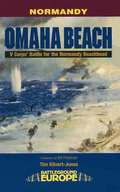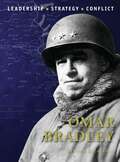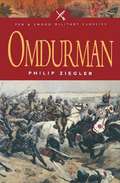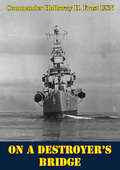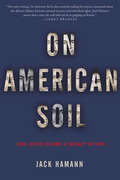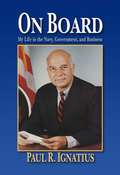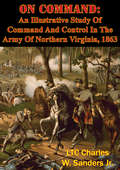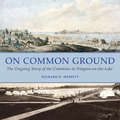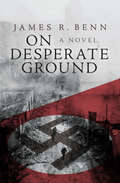- Table View
- List View
Omaha Beach: V Corps' Battle for the Normandy Beachhead (Battleground Europe)
by Tim Kilvert-JonesA traveler&’s guide to the history of the D-Day landings and points of interest around Omaha Beach in Normandy, featuring planned walking tours. As the left most inland flank of the D-Day landings, Sword Beach was thought most likely to receive the first German counterattacks. The British troops selected for the assault had the tasks of securing the beach and advancing on the heavily defended medieval town of Caen. The troops also were determined to link up with British paratroopers and glider units who had landed the night before on special missions and were not equipped to withstand an armored counterattack alone. Backed up by an impressive array of modified armored vehicles, the veteran 3rd Division, spearheaded by No. 4 Army Commando and 41 Royal Marine Commando, stormed ashore and secured its objectives with moderate casualties. No. 4 Commando also reached the airborne troops before they could be overwhelmed by German armor. However, the British failed to secure the key town of Caen on schedule. This book guides the reader through the battle for the V Corps beachhead, the fiercest and bloodiest of the landings. Whether you&’re interested in World War II history, have a relative who fought that day, or were inspired by Saving Private Ryan, this is the book for you.
Omake: Stories From the Warchild Universe
by Karin LowacheeIn the first collection of original stories based in the universe of the award winning novels Warchild, Burndive, and Cagebird, characters both familiar and new flesh out the worlds and lives impacted by a generational interstellar war. Included are the author's story notes, a glossary of the striviirc-na language, and the first chapter of the fourth novel in the mosaic series. Matrvoshka.
Omar Al-Bashir and Africa's Longest War
by Paul MoorcraftPresident Omar al-Bashir is Africa's and arguably Arabia's most controversial leader. In power since 1989, he is the first sitting head of state to be issued with an arrest warrant, for war crimes, by International Criminal Court.He has been a central personality in Islamic and African politics, as well as a love-to-hate figure for the US in the 'war on terror'.For military history readers, Al-Bashir is a field marshal who has fought possibly the world's longest conflict. Modern Sudan has been embroiled in war since 1955.No proper biography has been written on him before. Nor has there been a comprehensive military history of Sudan. The book briefly covers the military background until independence. Then it dissects the long north-south civil war until Bashir's Islamist military coup in 1989. Thereafter it narrates the wars in the east, south, west (in Darfur), International political and military intervention is also factored in.The author draws on in-depth one-on-one interviews with Bashir himself and his family and close political, military and intelligence colleagues.
Omar Bradley
by Steven Zaloga Steve NoonGeneral Omar Bradley was the premier US Army tactical commander in the European Theater of Operations in 1944-45. A West Point classmate of Dwight Eisenhower, Bradley was the quintessential US field commander of World War II, elevated to high command with little combat experience but a solid track record as a skilled planner and organizer. Bradley was part of a small cadre of highly skilled young officers groomed for higher command in the austere and bankrupt 1930s. Bradley began World War II in creating the new 82nd Division which would go on to fame as one of the US Army's premier airborne divisions. Bradley spent most of the early years of the war in George Patton's shadow, first as an assistant corps commander under Patton in Tunisia in early 1943, then as a corps commander under Patton on Sicily in July 1943. Patton's social blunders pushed him out of contention for the coveted spot leading the First US Army on D-Day, and Bradley's sterling performance on Sicily won him the position.Bradley was at the center of nearly all the major US Army victories in 1944-45 from D-Day through the final push into Germany. After commanding the US First Army in Normandy, Bradley was elevated to the command of the 12th Army Group, which contained the three main American field armies in the autumn of 1944. Along with that combat record came a string of controversies. Bradley's great victories like Operation Cobra in July-August 1944 were brought in to question by more dubious campaigns such as the miserable battles for the Hurtgen forest and the lesser-known Operation Queen in the autumn of 1944. Bradley's greatest blunder, failing to anticipate the German offensive in the Ardennes, was counter-balanced by a vigorous and skilled response which fatally injured the German army in the West. Beyond the performance of the US Army in the ETO, Bradley was also intimately wrapped up in other controversies, especially the internecine squabbles with his British counterpart, Bernard Montgomery.
Omar Bradley: General at War (The Generals)
by Jim DefeliceIn the years since World War II, military historians have focused on two larger-than-life personalities: George S. Patton and Dwight D. Eisenhower. But what of Omar Bradley, the American hero who led the forces at D-Day and was the head of the largest body of U.S. soldiers to serve under one field command? Picked by Patton to be his deputy during World War II, Bradley rose to become Patton's commander. He was known as the "soldier's general" for his compassion toward his troops, and he eventually became the first Chairman of the Joint Chiefs of Staff as well as an advisor to several presidents. Yet despite these achievements, Bradley has been largely overlooked by biographers. In his intriguing new book, Omar Bradley, award-winning author Jim DeFelice brings an American hero to life with a comprehensive and compelling biography about one of the most important--and overlooked--generals of World War II.
Omar Khadr, Oh Canada
by Janice WilliamsonIn 2002 a fifteen-year-old Canadian citizen was captured in Afghanistan for allegedly killing an American soldier. A badly wounded Omar Khadr was transferred to the US Bagram Air Force base and then Guantánamo Bay detention camp. He would remain there without trial until October 2010, when a military commission admitted evidence considered tainted by Canadian courts. A plea bargain and guilty plea initiated his promised return to Canada a year later. Some Canadians see Khadr as a symbol of terrorism in action. For others he is the victim of a jihadist father and Canadian complicity in the unjust excesses, including torture, of the US "war on terror." The youngest prisoner held at Guantánamo and the only citizen of a Western country not repatriated, Khadr was formally identified by the United Nations as a child soldier. In Omar Khadr, Oh Canada, over thirty contributors analyze Khadr's background, his incarceration, the actions of Canadian authorities, and the implications raised by his legal case. This multi-genre book includes essays, articles, poems, a play, extended excerpts from the documentary film You Don't Like the Truth, and other texts produced by distinguished contributors such as Sherene Razack, General Roméo Dallaire, Charles Foran, Kim Echlin, Judith Thompson, Audrey Macklin, Shadia Drury, George Elliott Clarke, Maher Arar, Rick Salutin, and Sheema Khan. While they sometimes disagree on issues such as radical Islam and Canadian multiculturalism, they all write from the conviction that Khadr's treatment has been - and continues to be - shamefully unjust and shaped by post 9/11 Islamophobia that continues to distort the views of many Canadians. Many Canadians are dismayed by the government's behaviour toward Omar Khadr. Adding strong and articulate voices to the debate, Omar Khadr, Oh Canada will educate and inform readers as his story continues to unfold. Contributors include: - Maher Arar, human rights activist and journalist. - Craig Kielburger, child labour activist and co-founder of "Free the Children Foundation." - George Elliott Clarke, poet, playright and English professor at the University of Toronto. - Luc Côté and Patricio Henriquez, screenwriters, directors, cinematographers, and producers of the documentary "You Don't Like the Truth - 4 Days Inside Guantánamo." - LGen Roméo A. Dallaire commanded the UN Assistance Mission for Rwanda in 1994 and was appointed to the Senate of Canada in 2005. - Gail Davidson, executive director, Lawyer's Rights Watch Canada. - Nathalie des Rosiers, General Counsel, Canadian Civil Liberties Association. - Robert Diab, lawyer and faculty member of Capilano University. - Alnoor Gova, broadcaster and PhD student, Simon Fraser University. - Shadia Drury, CRC Chair in Social Justice, University of Regina. - Kim Echlin, novelist, essayist, film producer. - Dennis Edney, former lawyer of Omar Khadr. - Charles Foran novelist, biographer. - Deborah Gorham history professor, Carleton University. - Yasmin Jiwani, associate professor in the department of Communication Studies at Concordia University. - Hasnain Khan, graduate student in political economy of international development at the University of Toronto. - Andy Knight, chair of the department of political science and professor of international relations at the University of Alberta. - John McCoy, PhD candidate in political science at the University of Alberta. - Sheema Khan, Globe & Mail columnist and author of Of Hockey & Hijabs - Audrey Macklin, member of the law faculty at the University of Toronto. - Monia Mazigh, human rights activist and author. - Marina Nemat, human rights activist and memoirist, author of Prisoner of Tehran and After Tehran. - Gar Pardy former diplomat, commentator and writer, served in Canada's foreign service from 1967 to 2003. - Sheila Pratt, Edmonton Journal journalist and author. - Sherene Razack, professor of Sociology and Equity Studies in Education, OISE, University of Toronto. - Rick Salutin, author and Toronto Star columnist. - Heather Spears, poet and artist. - Judith Thompson
Omdurman (Pen & Sword Military Classics)
by Peter ZieglerA you-are-there account of the 19th-century battle against the army of Abdullah al-Taashi that established British dominance in the Sudan. The death of General Gordon in Khartoum at the hand of the Dervishes is one of the most celebrated events in the history of the 19th century. Equally dramatic, but perhaps less well-known, is the extraordinary battle 14 years later in which Sir Herbert Kitchener avenged the murder of Gordon at Omdurman. Personal accounts of the legendary battle seen through the eyes of Private George Teigh and Lieutenant Samuel FitzGibbon Cox are included. Both the private and the officer kept diaries, both recorded the same events, but with vastly differing views. Difficulties with boots, bullets and gunboats are described, but it is the eye-witness accounts that give full flavor to a fascinating campaign, which saw the last full cavalry charge.
Omega Sector: Critical Response Books 4-6 (Omega Sector: Critical Response)
by Janie CrouchNow available in one incredible volume: three stories from USA TODAY bestselling author Janie Crouch. Previously published as Man of Action, Overwhelming Force, and Battle Tested!PursuitAndrea Gordon has became one of Omega Sector's top agents. Her skill at reading people is unrivaled—until she meets fellow profiler Brandon Han. Paired together to track a serial killer who has been targeting at-risk women, the two become entangled beyond the case. Then Andrea's own sordid past surfaces and they&’re forced to question everything about the assignment…and each other.RevengeDespite an illustrious career as a top hostage negotiator, Joe Matarazzo is haunted by the past. When Joe's exes begin to fall victim to a violent stalker, Joe seeks the help of Laura Birchwood—a lawyer and the woman he once loved. Despite old wounds, Laura agrees to help Joe find out who's framing him. And while they expect to be met with danger, they're unprepared for passion that still burns strong, and their determination to give what was between them a second chance. StalkedEverywhere she went, Rosalyn Mellinger had eyes on her. Meeting Steve Drackett on vacation only scares her more. Another person to be hurt by her stalker. But Rosalyn had no idea Steve was part of Omega Sector—literally no one better to protect her. Steve has years of experience, and while the Watcher preys upon Rosalyn, Steve is determined to beat him at his own game.
On A Destroyer’s Bridge
by Commander Holloway H. Frost USNAs the eyes and ears of the fleet, the Destroyers perform a vital role to any naval force; often given the dirtiest jobs of any task force, the Destroyer is the workhorse ship. In this fascinating volume, written by Commander Holloway H. Frost USN in 1935, the author describes how to best handle a flush deck destroyer in a variety of situations. Richly illustrated with diagrams Commander Holloway offers sage advice and reveals the secrets of the seaborne Destroyer, from formation cruising to handling the ship in heavy weather.
On A Wing And A Prayer (Lavender Road 3)
by Helen CareyON A WING AND A PRAYER by Helen Carey is a nostalgic and heart-warming novel of south London during the Second World War. The perfect read for fans of Ellie Dean, Kate Thompson and Donna Douglas.October 1941. London has been ravaged by war for two years now and life couldn't be tougher for those living on Lavender Road. Many loved ones have been lost and sacrifices made, but Lady Helen de Burrel is about to take the biggest risk yet.Inspired by the courage of her friends on this south London street, Helen volunteers to join the Special Operations Executive and puts her life in jeopardy for the sake of her country. But it's hard to know who to trust, and when her heart is on the line even love becomes dangerous.The war has changed everything, but one thing is certain; the women of Lavender Road will rally together, no matter what the future has in store...
On A Wing And A Prayer (Lavender Road 3)
by Helen CareyON A WING AND A PRAYER by Helen Carey is a nostalgic and heart-warming novel of south London during the Second World War. The perfect read for fans of Ellie Dean, Kate Thompson and Donna Douglas.October 1941. London has been ravaged by war for two years now and life couldn't be tougher for those living on Lavender Road. Many loved ones have been lost and sacrifices made, but Lady Helen de Burrel is about to take the biggest risk yet.Inspired by the courage of her friends on this south London street, Helen volunteers to join the Special Operations Executive and puts her life in jeopardy for the sake of her country. But it's hard to know who to trust, and when her heart is on the line even love becomes dangerous.The war has changed everything, but one thing is certain; the women of Lavender Road will rally together, no matter what the future has in store...
On American Soil: How Justice Became a Casualty of World War II
by Jack HamannOn a hot August night in 1944, a soldier’s body was discovered hanging by a rope from a cable spanning an obstacle course at Seattle’s Fort Lawton. The body was identified as Private Guglielmo Olivotto, one of the thousands of Italian prisoners of war captured and brought to America. The murder stunned the nation and the international community. Under pressure to respond quickly, the War Department convened a criminal trial at the fort, charging three African American soldiers with the lynching and firstdegree murder of Private Olivotto. Forty other soldiers were charged with rioting, accused of storming the Italian barracks on the night of the murder. All forty-three soldiers were black. There was no evidence implicating any of these men. Leon Jaworski, later the lead prosecuter at the Watergate trial, was appointed to prosecute the case and seek the death penalty for three men who were most assuredly innocent. Through his access to previously classified documents and the information gained from extensive interviews, journalist Jack Hamann tells the whole story behind World War II’s largest army court-martial—a story that raises important questions about how justice is carried out when a country is at war.
On Blazing Wings
by L. Ron HubbardLaunch into the action with this gripping tale. American David Duane long ago gave up his dream of being a professional artist. Instead, there's something else he's good at, something that countries will pay good money for--his services as an ace fighter pilot on sale to any country whose business is war, regardless of its politics.Duane's cold-edged neutrality takes him to Finland--combating Russian Communists bent on destroying a supply base. After leading multiple attacks against the Russians and pushing them further and further back, his luck runs out when his plane is shot down. Instead of crashing in flames, Duane finds himself in an elusive netherworld--a mystery-enshrouded city of luxury and golden minarets. There, Duane discovers his true destiny, one that he half-remembers but must struggle to reject in order to save the woman he loves--a woman who happens to be an officer . . . in the Russian ranks."His stories also give the feel of experience and firsthand knowledge of the subject matter." --Baryon* An International Book Awards Winner
On Board
by Paul IgnatiusInsights into important events of the twentieth century are provided in this memoir by a former secretary of the Navy and participant in many of the events he describes. The Great Depression of the 1930s, World War II, the Cold War, the Korean War, and Vietnam are recalled from the author's perspectives, first as a teenager in the 1930s, then as a naval officer in the 1940s, a defense department consultant in the 1950s, and a Pentagon official for eight years in the 1960s. There are new details on Robert McNamara's managerial innovations, the growth of the Army under President Kennedy, and the enormous effort to provide construction, supplies, and ammunition for the Vietnam War. The book includes vivid accounts of McNamara, Clark Clifford, Cyrus Vance, General Creighton Abrams, Admiral Thomas Moorer, and many others, There are high moments when Medals of Honor are awarded, low moments when the USS Pueblo is capture by the North Koreans, and perplexing moments over whether to praise or damn Admiral Hyman Rickover. Other significant events covered are the Pentagon Papers case, the illegal strike of the air traffic controllers, and controversial efforts to deregulate the airlines, the Arab oil embargo of the 1970s, and President Carter's attempt to lessen U.S. dependence on middle-eastern oil. Ignatius also offers intimate glimpses of his family life, including the period when his college-aged children were totally opposed to the Vietnam War, and his Armenian heritage, including memories of his grandfather's poems of freedom that forced him to leave his ancestral home. In the final chapter, Ignatius looks at the civil rights movement and efforts to gain equality for women as events of lasting importance to him.
On Broken Wings
by Chanel CleetonThe author of Into the Blue and Fly with Me returns with the newest, hot and high-flying Wild Aces romance...A year after losing her husband, Joker, the squadron commander of the Wild Aces, Dani Peterson gets an offer from his best friend, Alex “Easy” Rogers, to help fix up her house. Dani accepts, and their friendship grows—along with an undeniable attraction.Racked by guilt for loving his best friend’s widow, Easy’s caught between what he wants and can’t have. Until one night everything changes, and the woman who’s always held his heart ends up in his arms. Yet as Easy leaves for his next deployment, he and Dani are torn between their feelings and their loyalty to Joker’s memory. But when Dani discovers something that sends them both into a spin, the conflicted lovers must overcome the past to navigate a future together…From the Paperback edition.
On Building Peace: Rescuing the Nation-state and Saving the United Nations
by Michael SchulenburgOnly 25 years after the end of the Cold War, the Western-dominated global order is fading and our hopes that liberal democracy would spread and bring world peace are evaporating. While the West is increasingly preoccupied with its internal problems, threats to global peace have fundamentally changed: wars among nation-states and their alliances, once the dominant scourge of humankind, have almost disappeared and are replaced by a triple threat from intra-state armed conflicts, the failing of nation-states and the rise of belligerent non-state actors. The global peace we felt within our reach in 1991, is escaping us. On Building Peace seeks the answers that the UN Charter can no longer provide. Once meant as a guarantor for peace, the Charter was never designed to deal with intra-state conflicts and today its core principles are eroded. The book makes two rather simple, but possibly unpopular suggestions for preserving future peace: first, we must rescue the nation-state, not despite but because of globalization, and second, we must not further undermine the United Nations, but expand its Charter for dealing collectively with this triple threat. The struggle for survival in a world of limited resources and environmental degradation will deepen intra-state conflicts. We must prevent slipping back into a new round of Cold War-type confrontations and focus on finding collective solutions for building peace. For the sake of billions of people of future generations, we cannot get this wrong.
On Call In Hell
by Thomas Hayden Cdr. Richard JadickA riveting memoir from the Navy doctor praised as "Hero, M. D. " on the cover of Newsweek. Cdr. Richard Jadick's story is one of the most extraordinary to come out of the war in Iraq. At thirty-eight, the last place the Navy doctor was expected to be was on the front lines. He was too old to be called up, but not too old to volunteer. In November 2004, with the military reeling from an acute doctor shortage, Jadick chose to accompany the First Battalion, Eighth Marine Regiment (the "1/8") to Iraq. During the Battle of Fallujah, Jadick and his team worked tirelessly and courageously around the clock to save their troops in the worst street fighting Americans had faced since Vietnam. It is estimated that without Jadick at the front, the Marines would have lost an additional thirty men. Of the hundreds of men he treated, only one died after reaching a hospital. This is the inspiring story of his decision to enter into the fray, a fascinating glimpse into wartime triage, and a compelling account of courage under fire.
On Call in Hell: A Doctor's Iraq War Story
by Thomas Hayden Richard JadickThe author tells his experiences of working in Fallujah at one of the bloodiest battles in Iraq.
On Celestial Wings: U.S. Army Air Force Navigators in World War II
by Edgar D. WhitcombOn Celestial Wings, first published in 1995 recounts the training, deployment, and war-time experiences of a number of U.S. Air Force navigators during World War II. Included are 17 pages of photographs. Author Edgar Whitcomb (1917-2016) served as governor of the state of Indiana from 1969-1973, and in later life made a number of solo sailing voyages before returning to his home state.From the Foreword by Col Charles Mott: In November 1940, 44 young military cadets graduated from the first Army Air Corps Navigational Class at Miami University in Coral Gables, Florida. The cadets came from all parts of the United States-from the urban areas of the East Coast, westward to the Appalachian Mountains, to the Midwest and prairie states, to the Rocky Mountains, and the West Coast. These young men came from the inner cities, the farmlands, the mountains, and coastal regions, and they were all volunteers. Most were college-educated and in the prime of life. World War II was raging in Europe and it was becoming increasingly difficult for the United States to remain neutral. A few farsighted men in our small Army Air Corps saw the essential requirement for trained celestial navigators in our military aircraft.The instructor for this navigational class was a 34-year-old high school dropout by the name of Charles J. Lunn. Charlie Lunn had first learned the art of celestial navigation aboard freighter ships in the Caribbean and later as the navigator aboard Pan American Airline planes flying to Europe and Asia.This book was written by one of those young navigators, Edgar D. Whitcomb, from Hayden, Indiana. Ed Whitcomb tells about these young comrades-in-arms and draws vivid word portraits of them as we learn of their assignments to Air Corps units. We learn how they survived and how some died in World War II. We learn about Ed’s own pre-Pearl Harbor assignment with the 19th Bombardment Group at Clark Field in the Philippines and the unfortunate, and perhaps inexcusable, decision not to deploy our B-17 Flying Fortress bombers immediately after the attack on Pearl Harbor resulting in the loss of 40 percent of those aircraft as they sat parked at Clark Field when the Japanese destroyed that vital military air base on the afternoon of 8 December 1941.
On Command: An Illustrative Study Of Command And Control In The Army Of Northern Virginia, 1863
by Ltc Charles W. Sanders Jr.A key element in the practice of operational art is the command and control senior leaders employ to direct their forces in battle. This command and control encompasses not only the vision the commander has for the attainment of his campaign aims, but how he translates that vision and his intent into orders which lead to the securing of his objectives. Should the commander fail to impart his vision or intent to his subordinates the unity of effort of his forces will suffer as each subordinate will be left to determine for himself which actions on the battlefield are key to the success of the campaign. This, in large measure, was the case in the army of Northern Virginia in 1863, and the result was defeat on the battlefield.
On Common Ground: The Ongoing Story of the Commons in Niagara-on-the-Lake
by Richard D. MerrittThis tract of land in Niagara-on-the-Lake has witnessed an amazing cavalcade of Canadian history. For 250 years a large tract of oak savannah at the mouth of the Niagara River designated as a Military Reserve has witnessed a rich military and political history: the site of the first parliament of Upper Canada; a battleground during the War of 1812; and annual summer militia camps and the training camp for tens of thousands of men and women during the First and Second World Wars. In the midst of the Reserve stood the symbolic Indian Council House where thousands of Native allies received their annual presents and participated in treaty negotiations.From its inception, this territory was regarded by the local citizenry as common lands, their "Commons." Although portions of the perimeter have been severed for various purposes, including the Shaw Festival Theatre, today this historic place includes three National Historic Sites, playing fields, walking trails, and remnants of first-growth forest in Paradise Grove.On Common Ground chronicles the extraordinary lives and events that have made this place very special indeed.
On Conspiracies (Penguin Great Ideas)
by Niccolo MachiavelliMachiavelli is one of the most famous strategists of all time. In this collection he discusses the dangers of conspiracies, and the component parts of an army, vital for gaining and holding power in his day. He also gives advice on tactics and discipline, and explains why promises made under force ought not to be kept. GREAT IDEAS. Throughout history, some books have changed the world. They have transformed the way we see ourselves - and each other. They have inspired debate, dissent, war and revolution. They have enlightened, outraged, provoked and comforted. They have enriched lives - and destroyed them. Now Penguin brings you the works of the great thinkers, pioneers, radicals and visionaries whose ideas shook civilization and helped make us who we are.
On Courage: Stories of Victoria Cross and George Cross Holders
by The Sebastopol ProjectOn Courage is a collection of twenty-eight moving and inspirational stories of valour displayed by recipients of the Victoria Cross and George Cross. *£2.70 of the publisher's RRP of all copies of this book sold in the United Kingdom and Republic of Ireland will be donated to Combat Stress.*WITH CONTRIBUTIONS FROM:Alexander Armstrong, Baroness Hale, Bear Grylls, Bill Beaumont, Bobby Charlton, Katherine Grainger, Kelly Holmes, Derek Jacobi, Eddie Redmayne, Frank Bruno, Geoffrey Palmer, Jeremy Irons, Joanna Kavenna, Joanna Lumley, John Simpson, Joseph Calleja, Julian Fellowes, Kate Adie, Ken Dodd, Margaret MacMillan, Mark Pougatch, Mary Berry, Michael Whitehall and Jack Whitehall, Miranda Hart, Richard Chartres, Tom Ward, Will Greenwood, and Willie Carson.From RAF flight engineer Norman Jackson, who climbed out onto the wing of a Lancaster bomber in flight to put out a fire, using a twisted parachute as a rope, on the night his first child was born; children's writer turned Assistant Section Officer Noor Inayat-Khan, who was the first female operator to infiltrate occupied France and refused to abandon what had become the most dangerous post in the country; to Irish seaman and Antarctic explorer Tom Crean, who struck out alone for a supply depot during Captain Scott's expedition to the South Pole to save the life of his ailing companion, these courageous men and women are an inspiration to us all. Written by leading historians and authors Tom Bromley, Saul David, Paul Garlington, James Holland and Dr Spencer Jones, these incredible accounts tell of the recipients' determination and selfless actions in times of war. Each story is introduced by a public figure, including Mary Berry, Bear Grylls, Sir Bobby Charlton, Joanna Lumley, Eddie Redmayne and the late Sir Ken Dodd.
On Desperate Ground
by James R. BennDanger reigns supreme as Nazi Germany braces for a final showdown in this WWII thriller from the author of the Billy Boyle mysteries. On Desperate Ground is the story of men and women caught up in the death throes of Nazi Germany, struggling to maintain those things precious to them—life, an end to killing, and even sanity itself. Colonel Johann Faust has lost everyone he ever loved and feels he is going inexorably insane. He hears the haunting voice of his dead fiancée and the demons that roar through his mind as he perfects a plan to save Nazi Germany from defeat and insure a greater and deadlier new world war. Captain Dieter Neukirk, once a protégé of Faust&’s, is more concerned with saving the lives of his remaining men than sacrificing them in a fanatical last stand. Meanwhile, Elsa Klein, Dieter&’s lover and the chief social worker at a Berlin hospital, is engaged in her own dangerous work, providing medical care and identity papers to hidden Jews in the city. American Captain Mack Mackenzie, pulled from a military hospital before his wounds are healed, is assigned to investigate reports of a secret Nazi operation. Wanting only to make it home alive, Mack finds himself in a life and death struggle with unlikely allies and a ferociously determined opponent. Americans and Germans alike are drawn to a hilltop in the remote German countryside, where they find themselves between powerful armies and forced into a terrible decision that could end one war or begin a new one.
